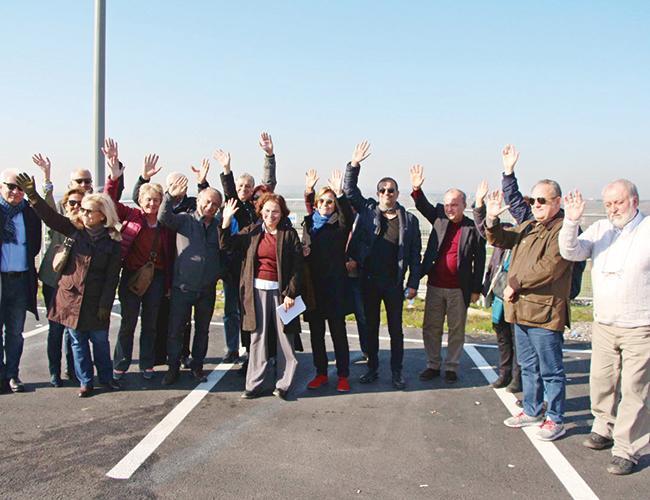
The high-schoolmates of Osman Kavala, the activist businessman arrested on Nov. 1 on terror charges, paid a visit to the Silivri prison on the outskirts of Istanbul to lend support to their friend. The group, which included Hürriyet and Hürriyet Daily News columnist Sedat Ergin, read the statement below in front of the prison.
Today we have gathered here as Osman Kavala’s high school classmates, in front of this prison, where he is being kept behind iron bars and deprived of his liberty. We are exercising our democratic right and objecting to his imprisonment.
We object because we believe a great injustice has been committed against Osman Kavala. As friends who know him well, we deny all allegations that Osman took part in a coup attempt or was in any way involved with a criminal organization masquerading as a religious community. Charging Osman as a putschist is as surreal, irrational and contrary to reality as arguing that the world is flat. As a true democrat, he has dedicated his life to struggling against the pro-coup mentality.
We are also gathered here because we want to demonstrate our affection, support and solidarity, announcing to the whole world that Osman is not alone. We are here to show that wire fences, iron bars, bolts locking cells and high concrete walls surrounding this prison facility cannot keep us away from him.
We are also here today to share our pride. This is the pride we take not only in knowing him, as classmates and friends, but also in witnessing the massive waves of support and displays of respect and admiration for him following his arrest - from both Turkey and the wider world.
Osman’s arrest and imprisonment have raised objections on a rarely-witnessed scale at the international level. The immense volley of protests has spread from the United Nations to the Council of Europe and the European Parliament, from parliaments to internationally prominent civil society and human rights organizations, and to globally reputable press institutions and universities. It spreads farther and wider every day.
What triggered this great surge? A piece written on Osman immediately after his arrest by Anthony Barnett, founder of the openDemocracy website, provides the most striking response to this question. Here is what Barnett wrote:
“There are those who try to be good. There are those who are good. And there is Osman Kavala, who is in a league of his own … That such a person should be alive gives everyone who knows him some hope, and this ripples out to those who are lifted by his unstinting efforts to overcome the pain of injustice and support dialogue and understanding.”
Such incredible outpourings reflect the hope he created in others, the voices he empowered against injustice…
In the same article, the author says Osman “is the incarnation of all that is good, generous, careful and humane.” His life story is one of selfless altruism, of devotion to the wellbeing of others and to society. He has spent his entire life attempting to improve the general conditions of his fellow man. As his friend, Kadir Has University academic Soli Özel underlines in another piece: “Osman has used his time, labor and good intentions to work for peace and dignity for all.”
He has rushed to everyone’s aid. Those he has set out to assist are minorities, communities with denied or unacknowledged identities, the socially excluded and marginalized, people subjected to injustices, those lacking the means and opportunities to make their suffering heard, those whose pain had to be shared. Ever a gateway to hope, Osman was always a major assurance for those in such situations.
His most important endeavor was the quest to build a permanently peaceful democratic environment in his native lands, so that Turkey could finally step confidently forward into the future. He worked steadfastly and relentlessly towards a peaceful solution for the Kurdish issue, opening up channels of dialogue for this purpose.
He had faith in the power of civil society to advance democracy and human rights in Turkey, supporting civil society initiatives, and spending all his resources to this end. He also believed in the power of culture and the arts to open all kinds of doors, enhancing efforts to contact the cultural “other” and overcome deep-seated problems we face. If and when the history of civil society in Turkey is written, Osman Kavala’s name will feature as a leading figure.
Imprisoning Osman not only means locking away a single human being inside a cell. It also means a jail sentence for the values and ideals he embodies.
As we stand here today, we salute not only Osman, but every person unjustly imprisoned and unfairly charged with thought crimes. We demand justice and freedom for them too.
When we graduated from our high school in 1975, stepping out into the wider world, we gazed into the future with hope.
We never once imagined that a great injustice befalling a beloved friend would reunite us in front of a prison 42 years later. But that same hope we felt on graduation day is still alive within us. We refuse to surrender to despair. Our presence here today is an expression of that refusal, a sign of our resilience. We do not lose hope because we know Osman never does, even behind those iron bars. He keeps giving us courage even from within his cell.
We believe this message of ours here today will transcend iron bars and doors and concrete walls, and even find a way to enter his solitary cell.
Osman is not alone in his one-person cell. Such an abundance of affection, sympathy and support from people whose lives he has touched, fills and illuminates his cell as a great beam of light.
We are not bidding Silivri farewell yet. We will be back. We will be here again to meet Osman the day he regains his freedom. We hope that day is not too far away.